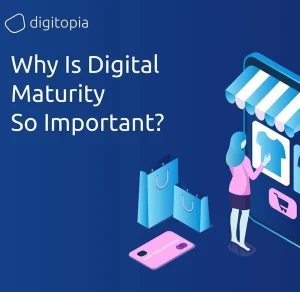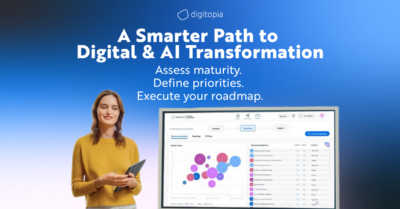
Digital maturity assessment is crucial. You would agree that knowing where you are on your digital journey to understand whether or not you are headed for success or failure and to benchmark that assessment against your peers is invaluable data. But which methodology to use?
First, there are tools, methods, and approaches to measuring digital maturity. Sound unbelievable?
Well, it definitely makes it difficult to choose the most suitable one.
Here is a comprehensive analysis of the tools out there.
Enjoy, and we wish that you find the best possible solution for your organisation.
- “Too Poor to Buy Cheap.”
You know the saying, “Nothing in life is free.” If you are offered something for free, you become suspicious. Why is it for free? Either there is no true value, or they will attempt to sell you something later.
There are many free tools and websites out there on the Internet. The so-called self-assessment tools are not truly providing value. The report you will get will only be read by a few, and will not be taken seriously.
Having experienced consultants by your side during the management presentation will make a huge difference.
Our Recommendation
Buy a proper “Digital Maturity Assessment Study”. One with real people, real sessions, real (detailed) reports, real conclusions, real recommendations, and a real management presentation. After all, you must still convince upper management to approve your decisions. A website will not do the job.
- “Can’t See the Forest for the Trees.”
This a breed of methodology where the end has been confused by the means. It’s not about the study itself; it’s about results and taking action. Organisations need to be able to deliver business value. So, the study itself is just a means to an end. The focus must always be on the outcome.
Why put an emphasis on this? A digital maturity assessment should not take months. A meaningful assessment should be completed within just a few weeks, and consume as little energy possible. The focus should be on recommendations, priorities, and a roadmap to further success.
Just think. If someone offers you a 3 – 4 month-long study, you should drawback and reconsider. If you are embracing agile workflows, your company and its digital capabilities will change within 4 months anyway. So, even after you spend those 3-4 months on this study, the measurement would still not be accurate, relevant, nor will it provide any insightful recommendation.
Our Recommendation
Hire experts on digital maturity assessments, and stay away from “process reengineering” or “industry 4.0 expert” kind of people. Research institutions and similar in-depth consultancies may be appropriate after you have defined your journey roadmap, or for certain tasks along the way, but will not serve you well if you are looking for an un-biased, to-the-point, and effective digital maturity assessment.
- Mirror, Mirror, on the Wall…
Remember the tale of “Snow White and the Magic Mirror.” The function of the mirror was to always tell the user how beautiful they were. Whether or not the Mirror spoke the truth was not important. The mirror said what the user wanted to hear. The same can happen with companies sometimes.
Any tech vendor or system integrator can tell you how “beautiful” you are, so to speak. Not only will they tell you how amazing you are, they will inform you that their systems, solutions, and services will make you even more successful. Then, when they run a digital maturity assessment for your organisation, not surprisingly their recommendations would be, you guessed it, always their own solutions. To reach this conclusion, you don’t need to pretend to run a digital maturity assessment.
Our Recommendation
Engage with a totally independent and unbiased consultancy for your digital maturity assessment. Assessing and benchmarking digital maturity is an area of expertise in its own right. Reaching the right conclusions, determining the right priorities, and coming up with an unbiased roadmap needs care, experience, and a sound methodology.
- You Can’t Do it Alone.
There are dozens of web sites out there providing various “digital something” self-assessment survey solutions for your digital transformation ailments. You may gather as a team, or fill them out individually, and even get some guidance along the way. But you can’t prevent bias.
Although we don’t always like to admit it, no matter which position(s) one may hold within an organisation, a person will have a limited and biased view about any given situation within an organisation. You are either very high ranking and have become distant from the details, or you work in a certain function, focused on your priorities. Iff you happen to get all the relevant people in one room and are able to reach consensus without a very experienced moderator; you will find it is next to impossible.
We also identified one more effect, which was discovered by psychologists David Dunning and Justin Kruger. Organisations with a lower digital maturity score, or alternatively, less knowledgeable people tend to overestimate their capabilities. You can’t avoid this phenomenon without external support.
Our Recommendation
Try out some of these self-assessments to prepare the need and importance of a proper digital maturity assessment service from an expert consultancy. You will realise and enjoy the difference.
- Serving Clients Requires Certain Capabilities.
Consulting requires empathy. It is necessary to have to be patient, listen and understand, and be able to read between the lines. Most importantly, it is very beneficial when the consultants have true, deep, relevant, and up to date experiences to provide the best advice to their clients.
There are some digital maturity assessments provided by research institutions, state organisations, or universities. While these are all very valuable establishments,, they are not consultancy firms. It is in their DNA to do research, make policies, or educate students. While they may be able to give advie based on informed decisions, they are no versed in delivering consultancy by heart. There is more to successful digital maturity assessment than “just” sitting with clients.
Our Recommendation
Invite various institutions into conversation and understand the difference. Once you speak to them, ask crucial questions, their true culture will come to light and you will see the points we are making here. Some will focus on deep-dive engineering stuff, some will deviate from the objectives and start talking about the national importance of a given topic, employment, and so forth. Others will boast about academic papers, and dwell toward philosophical arguments.
None of them will help you truly understand where you are, how you compare against your peers, tell you where you should be, and how to get there. This kind of consulting requires experience, speaking through the difficult emotions, making bold decisions, and focusing on consensus, priorities, and pragmatic execution.
Whatever you choose, we wish you good luck with your digital maturity assessment engagement.
May the digital forces be with you.


